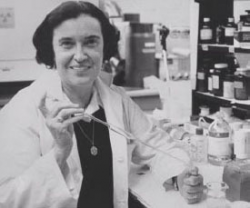Rosalyn Sussman Yalow

- Born
- 19 July 1921
- Died
- 30 May 2011 (age 89)
Rosalyn Yalow was an extraordinary scientist, Nobel laureate and role model for women in science in the twentieth century. She changed the world of medicine with her development of radioimmunoassays (RIA), an extremely sensitive technique for detecting small quantities of substances in blood, for which she won a Nobel Prize for Physiology or Medicine in 1977.
As she described herself, Yalow was a "stubborn, determined child" but she was interested in science from a young age. Growing up in New York, she fell in love with maths and chemistry in primary school. By the time she was in college in the late 1930s there were many breakthroughs in the field of physics. Yalow found inspiration in physics through the encouragement of her teachers, and in 1945 she received a PhD in physics from the University of Illinois.
Yalow's biggest achievement came when she developed a sensitive technique used to detect minute amounts of substances in the blood. This method is called a radioimmunoassay (RIA). Yalow used RIA to detect the presence of peptide proteins, proteins that affect the hormonal system, in human blood. The RIA technique is extremely precise yet relatively cheap and so can be widely used.
The RIA method has a wide range of uses, including screening blood donor supplies for hepatitis, treating hormone-related health problems, detecting some cancers in the blood, identifying the causes of allergy and gauging the effects of antibiotics and drugs. Needless to say, such a huge achievement did not go unrecognised, and Yalow was honoured with the Nobel Prize in Physiology or Medicine in 1977.
We cannot expect in the immediate future that all women who seek it will achieve full equality of opportunity. But if women are to start moving towards that goal, we must believe in ourselves or no one else will believe in us; we must match our aspirations with the competence, courage and determination to succeed; and we must feel a personal responsibility to ease the path for those who come afterwards. The world cannot afford the loss of the talents of half its people if we are to solve the many problems which beset us.
Rosalyn Yalow, speech at the Nobel Banquet
Yalow played a huge role in paving the way for equal opportunities for women. In 1976 she was the first female recipient of the Albert Lasker Basic Medical Research Award, honouring her achievements that contributed to the “elimination of major causes of disability and death”.
She went on to become a Professor at the Albert Einstein College of Medicine at Yeshiva University and later Professor at the Mount Sinai School of Medicine. In 1988 she was awarded the National Medal of Science, an honour presented by the President of the United States to individuals that have made “outstanding contributions to knowledge in the physical, biological, mathematical, or engineering sciences.”



